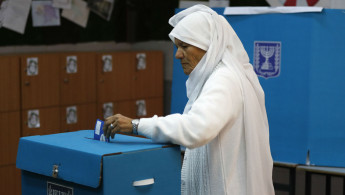'Israeli settler' targeted Palestinians with mass election boycott campaign, investigation reveals
The Hebrew-language TV channel discovered that dozens of banners appeared overnight and without warning along roads running between towns and villages in the majority-Palestinian area in central Israel known as 'the Triangle'.
The posters were emblazoned with an array of slogans in Arabic including "Boycotting is the will of the people" and "#IAmBoycottingKnessetElections".
Many residents believed the campaign to be run by Palestinians, as many factions have long supported boycotts of the election process.
However, the advertising company behind the banners revealed to journalists that "a Jew with an American accent" asked them to create a campaign encouraging Palestinians not to vote.
The man reportedly told the company: "There are many Arabs who don't want to take part in the election process, and we don't want them to vote".
He added he had a "serious amount" of money for whoever wanted to launch his campaign, which turned out to be roughly 250,000 shekels (71,000 USD), at least some of which was funded by a US-based NGO.
Twitter Post
|
Speaking to Channel 12 about the man in question, the owner of the advertising company said: "I think he's someone from the settlements. He said I should bring him a receipt and the receipt will be sent to the United States, some nonprofit there, and they will send me the money. He said he wants as few Arabs as possible to vote."
The incumbent Prime Minister, Benjamin Netanyahu, won the elections in April, however after failing to form a coalition, elections are being re-held on September 17.
Netanyahu's right-wing Likud party usually draws on support from far-right, religious Zionist and ultra-orthodox parties to form a coalition.
This means that anti-Arab slogans have become increasingly commonplace in Likud's election campaigns, in order to shore up support from across these hardline factions.
Palestinians make up roughly a fifth of the population of Israel, making them an important voting bloc. However their marginalisation in Israeli society has left many disillusioned with the electoral process and voter turnout has been historically low.
Despite a huge mobilisation effort by Palestinian parties in April, turnout was just 49 percent.
This time around, the country's main Arab parties have unified, hoping to attract a larger share of the vote and top their 2015 performance which saw them become the third-largest force in parliament.
Follow us on Twitter: @The_NewArab





 Follow the Middle East's top stories in English at The New Arab on Google News
Follow the Middle East's top stories in English at The New Arab on Google News


![22 Arab countries at COP29 have rejected the targeting of fossil fuels [Getty]](/sites/default/files/styles/image_330x185/public/2024-11/GettyImages-2184289638.jpg?h=199d8c1f&itok=ptHl5bec)